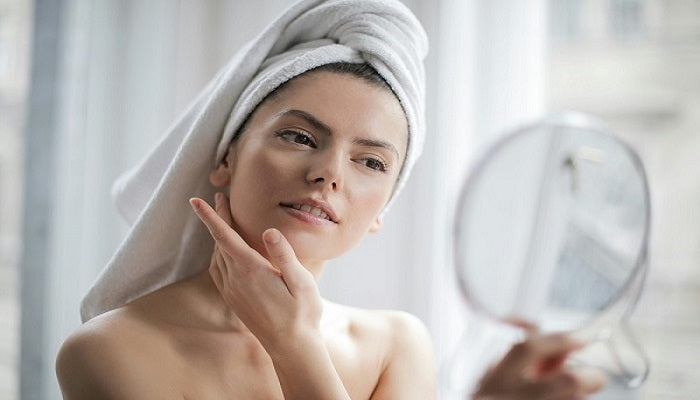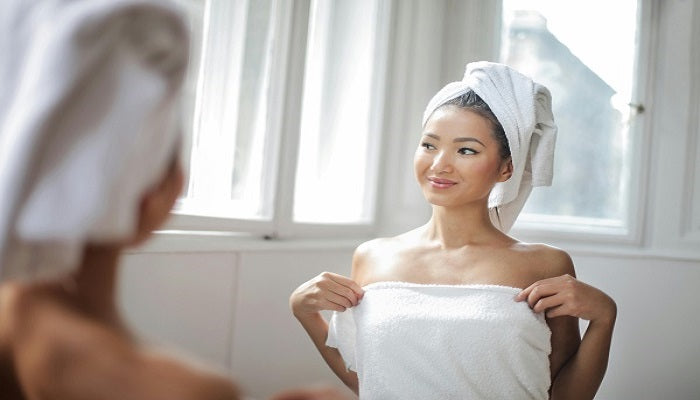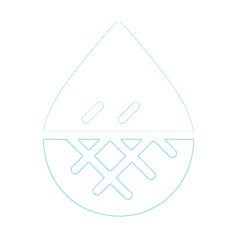Introduction:Is Hard Water Around You?
Have you ever encountered this kind of trouble: there is always a stubborn layer of white limescale accumulated on the tap? Glasses always leave an unsightly ring of water stains after washing? Your skin is still dry and tight after a shower, and your hair is dry and knotty and difficult to manage? These seemingly everyday problems, in fact, behind the hidden a common ‘culprit’ -—hard water.
Hard water is water that contains high concentrations of mineral ions such as calcium and magnesium, but in the U.S., the problem goes far beyond that. Chlorine and chloride are also present in about 85% of home tap water in the United States in order to sterilise the water. Although chlorine is not a defining component of hard water, it is an often overlooked but extremely harmful ‘hidden killer’.
Chlorine's sterilising effect is undeniable, but it also causes strong irritation to our skin and hair. Chlorine breaks down the natural oil barrier on the surface of the skin, making it dry, sensitive, and even causing eczema, allergies, or acne; it also opens up hair scales, resulting in rough, dull, and brittle strands that break and fall out easily. This is the fundamental reason why skin and hair problems continue to recur even when you use high-end skincare products and shampoos.
In this blog, we'll take you on a comprehensive tour of the nature of hard water, revealing its far-reaching effects on your skin, hair, and your entire life. What's more, we'll also provide you with a simple yet effective solution - one that will help you filter out the harmful substances in your water at source, so you can easily say goodbye to dry skin and frizzy hair, and return to your natural, healthy state of life.
Water is the most unassuming yet basic element of life. Improving water quality is often the first step to improving the quality of life. Now, let's uncover the truth about hard water and start a whole new chapter of healthy water.

What is Hard Water?
What is water hardness
Hard water in the United States develops primarily because groundwater, as it flows through rock formations rich in calcium and magnesium minerals, absorbs ions of these minerals, causing the water to harden. In many areas of the United States, especially in the Midwest and Southwest, the ground is rich in minerals such as limestone (calcium carbonate) and dolomite (magnesium carbonate). These rocks dissolve calcium and magnesium ions when they come in contact with rain or groundwater. As water flows underground, it ‘absorbs’ these minerals and the hardness increases. Hard water is especially common and severe in areas where groundwater is the main source of water.
The hardness of water supplies can vary depending on the local geology. The hardness of water is expressed in mg/l CaCO3 (calcium carbonate) and can be categorised as follows:
|
|
Water Hardness(mg/l CaCO3) |
|
Soft |
Up to 100 |
|
Slightly hard |
100-150 |
|
Moderately hard |
150-200 |
|
Hard |
200-300 |
|
Very hard |
More than 300 |
Table 1:Hardness of Water
According to the U.S. Geological Survey, water is hard in most areas of the United States. Whether the water in your home is supplied by a well or a city, you may have hard water. While drinking hard water is not considered a health risk, hard water is the cause of many problems in your home. It can be the cause of many skin and hair problems.
Hardness of groundwater from domestic wells, a USGS study
The more calcium and magnesium dissolved in the water, the harder the water will be. This is why some cities and counties in the same state have different water hardness.
A study by the National Water Quality Assessment (NAWQA) programme evaluated the water quality of approximately 2,100 domestic wells across the United States. Water hardness was one of the water quality parameters studied and the results are shown in the graph below.

Source:USGS
It can be seen that hard water is prevalent in the east-central and western United States, reflecting the distribution of carbonate aquifers and aquifers with relatively high concentrations of dissolved solids.
In addition to minerals, chlorine is a key factor. Domestic water in the U.S. typically contains high levels of chlorine or chloramine, which is used to disinfect drinking water. Chlorine is effective in killing bacteria, viruses and other disease-causing microorganisms in water. Compared to other disinfection methods, chlorine disinfection is more sustainable and maintains a residual disinfection effect in the plumbing system, ensuring safe water coming out of the tap.However, although chlorine can sterilise the skin, it is extremely irritating to the skin and hair. It can break down the natural oil barrier on the surface of the skin, making it dry, sensitive and even causing eczema; it can also open up the hair's scales, leading to rough, dull, brittle and brittle hair. In addition, the volatile gases of chlorine are particularly noticeable in hot water, and can potentially affect the respiratory tract when inhaled in the shower.
Hard Water vs. Soft Water
The hardness of water depends largely on the amount of calcium and magnesium it contains. High levels of these and other minerals make water hard. Soft water tends to contain higher levels of sodium or salt rather than higher levels of calcium and magnesium.
- Soft water has less than 17 parts per million
- Slightly hard water has 17 to 60 parts per million
- Moderately hard water has 60 to 120 parts per million
- Hard water has 120 to 180 parts per million
- Very hard water has greater than 180 parts per million

Many hard water areas in the United States use groundwater, which has a high microbial burden, so more chlorine or chloramine is added to the treatment process to disinfect and prevent secondary contamination. Chlorine is strongly oxidising, and prolonged exposure may damage the skin barrier, triggering dryness, itching, and redness, as well as oxidising hair keratin, leading to frizz, breakage, and colour fading.
In contrast, certain soft water source areas, such as water systems based on lake or snowmelt water, typically have a lower need for chlorine disinfection and relatively manageable residual concentrations.

How Hard Water Affects Your Hair
Calcium, magnesium and chlorine in hard water work in tandem to cause multiple damages to the hair:
Scalp Dryness and Itching
Minerals and soap scum form a film on the scalp that clogs pores and sebaceous glands, interfering with the scalp's normal oil production and protective functions. The result is a dry, flaky, itchy scalp that creates an unhealthy environment for hair growth.
Hair Follicle Issues
Mineral deposits and residues can block the opening of the hair follicle, affecting the follicle's respiration and nutrient supply, leading to inflammation and possibly preventing new hair growth or making existing hair more susceptible to shedding.
Cleaning Problems
Shampoos do not lather well, conditioners and other products are difficult to rinse out thoroughly, and hair feels sticky or stringy after washing.
Additional Effects of pH and Chlorine
Healthy hair and scalp environments are weakly acidic. Hard water, especially with high chlorine residue, raises the pH of the scalp and hair, making it alkaline. The alkaline environment further encourages the opening of the hair scales, exacerbating hair dryness, frizz and damage. At the same time, chlorine, as a strong oxidising agent, directly destroys the keratin structure in the hair, leaving strands fragile and prone to breakage, and may bleach hair colour. Chlorine also strips the scalp and hair of essential natural oils.

Does hard water cause hair loss? Take a look at the truth behind the science
Hard water itself is usually not the sole or direct cause of hair loss, but it can certainly exacerbate the problem through a number of mechanisms:
Deterioration of the scalp environment
As mentioned earlier, dryness, itchiness, inflammation, and clogged follicles on the scalp caused by hard water can weaken the health and vitality of the hair follicles, making it more likely that hair will go into a resting phase and fall out. Ongoing scalp inflammation may cause progressive damage to hair follicles.
Hair is fragile and prone to breakage
Mineral deposits make hair heavy and brittle, and damage to the hair scales exposes the internal structure of the hair to be vulnerable to damage. Combined with oxidative damage from chlorine, the hair as a whole becomes brittle and is more prone to breakage (breakage) during daily activities such as combing and styling, rather than falling out from the root, but visually the hair appears thinner.
Impacts the effectiveness of treatment products
Hard water residue can prevent hair growth products or medications from effectively reaching the scalp and hair follicles, reducing their effectiveness.
Conclusion
While hard water is not the root cause of hair loss (genetics, hormones, stress, etc. are usually the primary causes), it is a significant environmental aggravator. It significantly exacerbates the extent and rate of hair loss by compromising scalp health, destroying hair shaft integrity and interfering with normal care, and making hair look unhealthier and thinner overall. The mineral deposits and chlorine in particular cannot be ignored for their negative impact on the hair and scalp.

How Hard Water Affects Your Skin
The damage to the skin caused by hard water also stems from the deposition of minerals (especially calcium and magnesium) and the action of chlorine:
Damage to Skin Barrier: The skin has a natural protective film on the surface of the skin (sebaceous membrane), formed by the emulsification of sebum and perspiration, which locks in the water and protects it from external stimuli. Minerals and soap scum formed in hard water can remain and coat the skin, damaging this protective film.
Interference with Cleansing: Hard water reacts with cleansing products (soaps, cleansers) to create soap residues that cannot be easily rinsed off. These residues not only irritate the skin themselves, but also continue to strip the skin of its own natural oils.
Dry, Itchy Skin
This is the most common skin effect of hard water. The loss of the protective barrier accelerates water loss from the skin, and residual soap scum irritates nerve endings, causing the skin to feel tight, dry, rough, flaky, and itchy.
Clogged Pores
Residual mineral particles, soap scum, and excess oil production due to the damaged barrier tend to clog pores, causing blackheads, whiteheads (acne), and even inflammatory pimples. Long-term clogging also accelerates skin aging.
Exacerbation of Eczema or Dermatitis
For people with existing allergies, eczema, atopic dermatitis, or psoriasis (psoriasis), the irritating and barrier-breaking effects of hard water can dramatically exacerbate the symptoms of these skin disorders, making the skin redder, itchier, and more inflamed.
pH Imbalance
The surface of healthy skin is weakly acidic (pH 4.5-5.5). Hard water is usually neutral or mildly alkaline. Frequent exposure to hard water raises the pH of the skin's surface and disrupts its weakly acidic environment. This imbalance weakens the skin barrier function and disrupts the skin micro-ecology (beneficial flora), making the skin more susceptible to harmful bacteria and becoming more sensitive, fragile, and less able to repair itself.
Impact of Chlorine
- Oxidative damage: As a strong oxidising agent, chlorine directly attacks skin cells, destroying collagen and elastin and accelerating skin ageing (dullness, fine lines, sagging).
- Irritation and Sensitisation: Chlorine itself is an irritant and may cause redness and a burning sensation on the skin. It may also react with other organic substances to produce disinfection by-products (e.g. trihalomethanes THMs), which are potential irritants and allergens for sensitive skin.
- Disruption of micro-ecology: Chlorine kills micro-organisms indiscriminately, disrupting the micro-ecological balance of beneficial flora on the skin's surface, lowering the skin's natural defences and increasing the risk of infection and inflammation.
Solutions: How to Protect Your Hair and Skin from Hard Water?
Hard water and chlorine aren't fatal problems, but they are quietly depleting your skin's health in your daily shower. In the long run, they can be the ‘invisible culprits’ behind dryness, sensitivity, and even chronic inflammation. The good news is that with a few simple changes, you can regain healthy skin and lustrous hair.
Install a Whole-House Water Softener
This is the most complete solution. A water softener removes calcium and magnesium ions from the water (replacing them with sodium or potassium ions) through ion exchange technology, solving hard water problems at their source. It prevents limescale, improves cleaning, protects water-using appliances and significantly reduces direct damage to skin and hair from hard water.
Advantages: Comprehensive effect, solves hard water problems at all water points.
Disadvantages: High initial purchase and installation costs, requires regular maintenance (adding specialised salt or potash) and may slightly increase the sodium content of your drinking water (be aware of sodium restriction), and does not specifically remove chlorine.
Install a Filtered Shower Head
If you find whole-house water softeners costly and complicated to install, a filter shower head is a very practical and economical option. A high quality water filter for shower head effectively filters out calcium and magnesium ions (partial softening), free chlorine/chloramines, heavy metal impurities, sediment and even some bacteria from your water. It purifies the water directly from the source where you touch your skin and hair.

Recommended product: AquaNurture Filtered Showerhead
We recommend a shower head with dual or multiple filtration technology containing KDF-55 (highly effective in reducing chlorine, inhibiting microorganisms, and removing heavy metals) and Calcium Sulfite (specialised in removing chloramines). For example, the AquaNurture Filter Showerhead features a dual filtration system of KDF-55 and Calcium Sulfite, which effectively removes harmful substances from hard water, significantly enhancing the bathing experience and improving skin and hair feel after washing. Users feedback that after washing, the skin is more hydrated and smooth without tightness, the hair is softer and easier to comb, and the dryness and itchiness are reduced.

Conclusion: Don’t Let Hard Water Control Your Skin and Hair
When it comes to hard water minerals and chlorine, which are invisible but accumulate to the detriment of your skin and hair, the most direct and effective way is to purify the water before it touches your body. Filtered shower heads are a convenient solution for just that.
Hard water damage occurs every day and the symptoms (such as poor skin, damaged hair, increased hair loss) are often slow to appear or attributed to other causes (such as age, stress, ineffective hair care products). Don't wait until the problem is serious to take action.
The first step to change can be simple: start by acquiring an efficient filtered shower. A simple replacement action can dramatically improve your daily bathing experience and long-term beauty and health benefits.
Investing in an AquaNurture filtered showerhead is an investment in healthier skin, shinier hair and a better lifestyle! Act now to upgrade your bathing water quality and enjoy a purer, gentler, and more reassuring water experience, starting with daily cleansing!

Why are filtered shower heads (like AquaNurture) recommended?
Affordable
Compared to the thousands of dollars of whole house water softeners, the filtration shower head is a cost-effective solution to optimise the quality of local (bath) water.
Efficient filtration
selected KDF-55 and calcium sulfite and other internationally authoritative filter media, scientific combination, targeted and efficient removal of hard water ions, residual chlorine / chloramines, heavy metals and impurities, to avoid some products on the market blindly stacked a variety of inefficient filter media.
Skin and hair care
effectively reduces hard water mineral deposits and chlorine residue, significantly improving the post-wash feeling: skin is more hydrated and smooth without tightness, hair is more supple and easy to comb, reducing dryness and itchiness.
Enhance the bathing experience
AquaNurture provides three water modes for flexible switching: PowerJet for strong massage to wash away fatigue, RainFlow for gentle coverage, and MistSpa for ultra-fine mist like SPA, to fully satisfy the personalised needs of different people.
Easy to use, low average daily cost
Easy to install, a single cartridge can be used for about 3 months, the average daily cost is very low.
FAQs:Frequently Asked Questions About How Hard Water Affects Hair and Skin
Q1:Can hard water hair and skin damage be fixed?
A: Damage caused by hard water can be fixed in many ways, but it requires some commitment and effort. Install a water softener shower head to filter water, try a clarifying shampoo, treat yourself to a leave-in mask or moisturizer, rinse with purified bottled water, apply naturally acidic rinses, or use an oil treatment.
Q2:How do I know if hard water is affecting my hair and skin?
A: Many things affect your hair and skin, and it's hard to know what the culprit is. Signs of hard water damage include frizziness, dryness, tangling, split ends, breakage, and thinness.Effects on the skin include dryness, itching, and worsening of eczema or dermatitis. If you have a combination of these problems, hard water may be the cause.
Q3:Is hard water hair loss reversible?
A: Typically, hard water hair loss can be reversed. The longer the exposure to the water, the more difficult the repair, but it’s always possible. Hard water doesn’t cause permanent hair loss, and changing to a filtration shower head can reverse this effect.
Q4:Are there any health risks associated with hard water?
A: There are no serious adverse health problems associated with drinking hard water.However,hard water can cause dry skin and hair. Washing your hair regularly with hard water can make your scalp itchy. The minerals in hard water can also change the pH balance of your skin, weakening its ability to act as a barrier to harmful bacteria and infection. People with eczema may be particularly vulnerable. If you notice dry skin and hair problems, you can combat the effects of hard water by switching to a filtered shower head.
Q5: Can chlorine in tap water also harm skin and hair?
A: Chlorine is a commonly used disinfectant for water treatment, but it has significant oxidising properties for skin and hair. Chlorine destroys the natural flora of the skin and strips the skin and hair of their natural oils, leading to dryness, irritation and even accelerated hair breakage and colour fading.
Q6: How do I deal with the effects of hard water on my skin and hair?
A: The most direct solution is to use a shower head with filtration. It effectively removes calcium and magnesium ions, chlorine and impurities from the water, significantly reduces skin and hair irritation from hard water, and allows you to enjoy a ‘soft water’ bathing experience at home.







Leave a comment
This site is protected by hCaptcha and the hCaptcha Privacy Policy and Terms of Service apply.